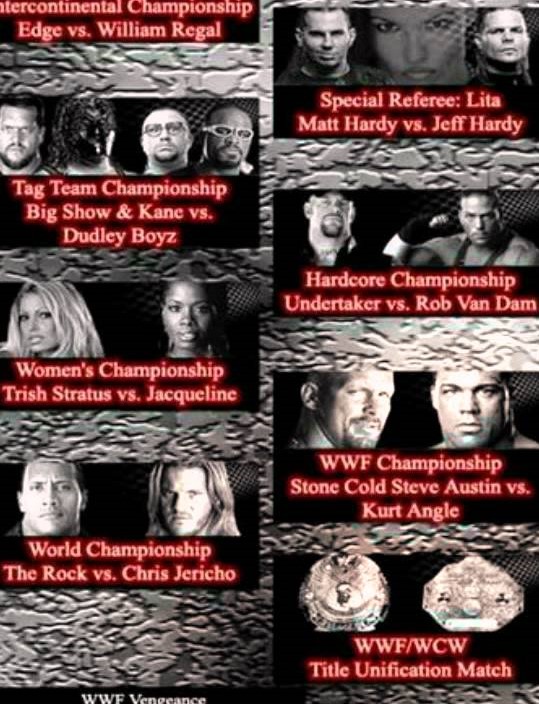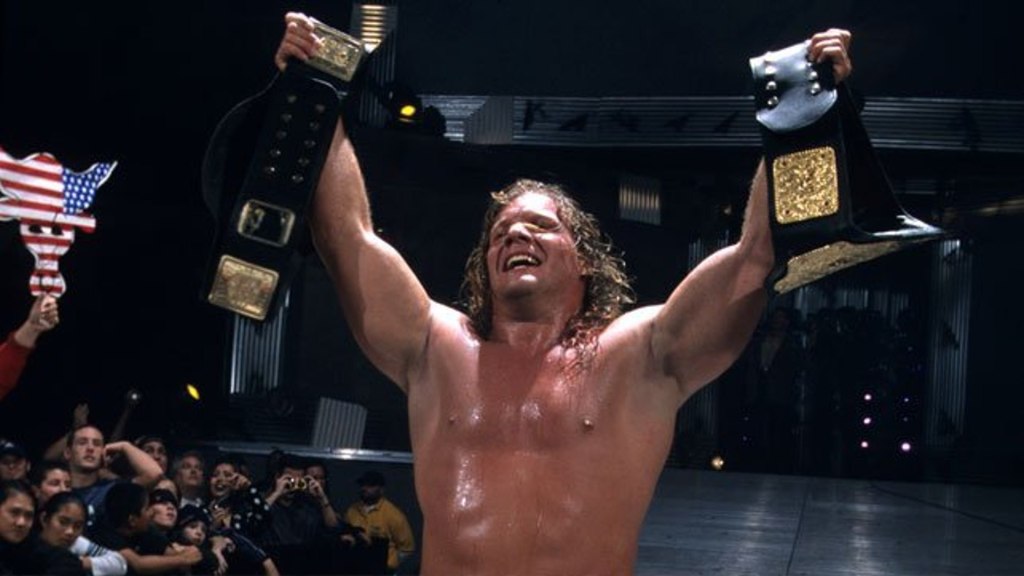In the first of a new series, which takes a look at past WWF/E events, Wrestling Retrospect takes a look Steve Austin’s last ever event as a champion
The Invasion era is over. The WCW/ECW Alliance, defeated just the previous month as Team WWF won the 5-on-5 elimination match against Team Alliance at the Survivor Series, is no more. WCW titles were also unified with their WWF counterparts, with only the WCW Title belt remaining, which was also quickly renamed the World Title. It was a storyline that proved divisive, but nowhere near as divisive as the premium event that followed. WWF Vengeance was meant to usher in a brand-new era, but instead became one of WWF’s most transitional events.
Let’s begin, as the saying goes, at the beginning. Wrestlemania X-Seven, which remains the greatest Wrestlemania of all time, sent shockwaves around the wrestling world with Stone Cold Steve Austin’s now iconic heel turn with Vince McMahon. The demise of WCW became instantly integrated into WWF programming following its purchase by its fiercest rivals, the kayfabe angle being Shane McMahon snatching his father’s limelight and WCW acquisition right from under his nose. Inevitably, this led to both McMahon’s facing off at WM in a street fight, with Shane’s coast to coast-led heroics resolving everything but the prospect of a WWF-owned WCW. After a period of trial and error, mostly error, WCW/ECW talent were made to be the bad guys; match disruptions, backstage attacks, even WCW officials were largely corrupt. It had to end eventually, given there was literally too much talent to manage. Unifying the lower-tier titles was but the first step on the path to “normality”, and Vengeance would serve as the event to unify the big ones.
Following all of the WCW title absorption, the Vengeance card read like any pre-Invasion card, including most of the members. Most matches were pretty duff, with the upcoming Trish Stratus wrestling showcase trimmed down to a mere three minutes, the main victim of time-cutting. Matt and Jeff began an interesting, acrimonious yet ill-timed split, Matt being the frustrated antagonist that would force both the split and a match against brother Jeff in just three weeks of programming. Its an idea that would becoming revisited in years to come, but needed more work for it to have an effect on a pay per view crowd. Edge vs. William Regal was better, both forming strong mid-card entertainment, with Edge’s Intercontinental title win a step in their back and forth programme. Speaking of mid card, surviving Alliance member Rob Van Dam was unable to defend his own title against another heel-turned big name, The Undertaker, in a fairly entertaining yet visually flawed Hardcore championship match. Come on, we all saw the crash matts.
The edition of Raw less than 24 hours after the Invasion era was ended, Vince declared the WCW the “World Title”. Shane and Stephanie also soon departed; the latter made an example of as only her father knows best. ECW’s Paul Heyman, who served as Jerry the King Lawler’s colour commentary replacement on Raw and PPV events was embarrassingly fired, only to be replaced with…. Jerry the King Lawler, returning after a recent separation from Stacy “The Cat” Carter. And so, less than half an episode of Raw later, with undoubtedly the best wrestling commentary team ever back in place, it was as if the Invasion never happened, remaining champions aside. But it was the path of one wrestler’s career that would also drastically change like no other, with the events defining him as opposed to the other way around. That man: Stone Cold Steve Austin.
2001 was a massive year for the Bionic Redneck. Royal Rumble winner, WWF Champion for 237 days and two reigns, and once again WWF Tag Team champion. His first title of 2001, a fifth overall, brought about one of the most shocking heel turns in wrestling as he sided with Vince McMahon to ensure he would regain the WWF Championship. Gone was the beer swilling, rampaging anti-hero, as Austin became an ultra-Vince loyalist. When the WWF was under threat from the Invasion, Vince demanded the old Stone Cold return, but instead Austin would go on to betray the WWF and become the leader of the Alliance. Austin’s character would again morph rapidly into a deranged, desperate, and hilariously paranoid champion who defended the Alliance right up until the end. That same next night on Raw would not only revert his character back to his ass-whooping ways but would be one of many face/heel flips across the roster. Austin’s theme music, the more thrash metal effort used through his time in the Alliance was reverted to the theme used before his lengthy injury break in 1999. It all felt a little lost in time in what would prove to be Austin’s last ever main event as WWF Champion also, at Vengeance. What?
Kurt Angle, another contender for title unification, would ultimately end his own long-standing feud with The Rattlesnake at Vengeance. Originally Team WWF’s poster boy champion, even winning the title from Austin for a brief time, Kurt was Vince’s ace in the hole, infiltrating the Alliance as a mole (rhyme not intended), ultimately handing Team WWF the victory. But like Austin, Angle’s character also instantly flipped the next night, along with Vince, becoming two of the top heels in the company. It made sense given the crowd showed no gratitude to Kurt for the Survivor Series save, so this turn wrote itself, and Kurt plays the role perfectly. Although he was originally penned in to win the Undisputed Championship at Vengeance, recently confirmed by Kurt Angle himself, ultimately that decision was changed to someone who needed it much, much more for their career and rise in status at the time. As a result, Angle losing at the first hurdle to a Stone Cold Stunner and would have to wait another year to win Championship gold.
And what of the remaining challengers, WCW Champion The Rock and Chris Jericho? The latter had won and lost the WCW title to The Rock in October and November respectively, the former giving Jericho a mighty push for what had already been a great year for the Canadian. Believing himself to be the best, his heel turn was driven to desperation, using a steel chair to beat The Rock, and almost every subsequent victory being underhanded, only fuelling his own ego more. This ego almost cost Team WWF at Survivor Series, attacking The Rock despite the risk of losing his own job. Going into Vengeance, Jericho became the perfect fourth entity to face off for ultimate gold. His desperation, dastardly manoeuvres, and chemistry with The Rock simply too good not to use. This was certainly match of the night, with Jericho coming out on top following heavy interference and knocked out referees. As soon as it was over, the shattered glass sound-byte hit the San Diego Sports Arena for Stone Cold Steve Austin’s final ever title defence.
The first ever Undisputed WWF Championship match got underway literally just after Jericho pinned The Rock. The lack of reaction from the crowd to a second dose of Austin’s theme pertains to an uncertainty of his character at this point. Face/heel turns are a natural occurrence in sports ent-sorry, WRESTLING, but after such a seismic eight months as the company’s top heel the audience simply weren’t ready to forgive just yet, just a mere three weeks later. And it showed; given every main event since (and including) July’s Invasion involved Austin, Rock, Angle and Jericho in some capacity, WWF was becoming a tired and laboured affair. Having Austin and Jericho in the final made complete sense, as did the latter being pushed into the top spot via heavy interference by an “unemployed” Booker T. Of all those main eventers, Jericho absolutely needed it the most, but did also highlight the need for a much-needed change in opposition talent. That would begin with the return of Triple H a month later. You’ll notice Triple H appearing in the official poster above front and centre, even appearing in much of the advertising. In the end it was too soon for his actual return, and too late to change the finished advertising. Given his importance, it shows how important Triple H would be not only after Vengeance, but for many years to come.





